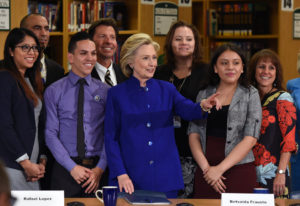
The Los Angeles suburb of Whittier, California was once Nixon territory and consistently voted for conservative Republicans. But in the 1990s, Mexican-Americans started moving into the town, which now has a two-thirds Latino population. Across the country, many white citizens voted for candidates, Bernie Sanders and Donald Trump, whose main selling points were condemning attacks on the “establishment”. Yet, the minority vote leaned towards Hillary Clinton, especially in Latino districts.
There is now a realization that the people least likely to want upheaval are those who have struggled to gain access to the status quo. Unlike white voters, who may be trying to reclaim the lost status of past generations, middle-class Latinos are trying to protect their own hard-fought successes. They “have a very acute awareness of the racism and structural inequalities that they have had to overcome and that continue to threaten their success,” said Jody Agius Vallejo, the author of “Barrio to the Burbs: The Making of the Mexican-American Middle Class.”
3.5 million Democrats turned out to vote, and nearly 2 million of them voted for Clinton, who beat Sanders by 12 points. During both of her presidential campaigns here, though, she benefited from what the pundits called her “Latino firewall,” the Mexican-American middle class that resisted the call to change—whether it came from Sanders or Obama.
While Sanders did well with young Latinos, a majority of the grownups resisted the call for radical change. “Many middle-class Mexican Americans appreciate Bernie’s idealism, but Hillary is the safer vote for people who have worked very hard to fulfill the American dream that began when their parents migrated here, and struggled, to give them a better life,” said Agius Vallejo.
The awareness among middle-class Latinos that they are on an upward path is critical to understanding their mindset this election year. A recent Pew survey found that Latinos nationwide are much more optimistic about their personal finances than the general public. People who have had their first taste of stability, if not privilege, are more likely to be protective of their interests than those who have felt the system has benefited their group all along.

Recent Comments